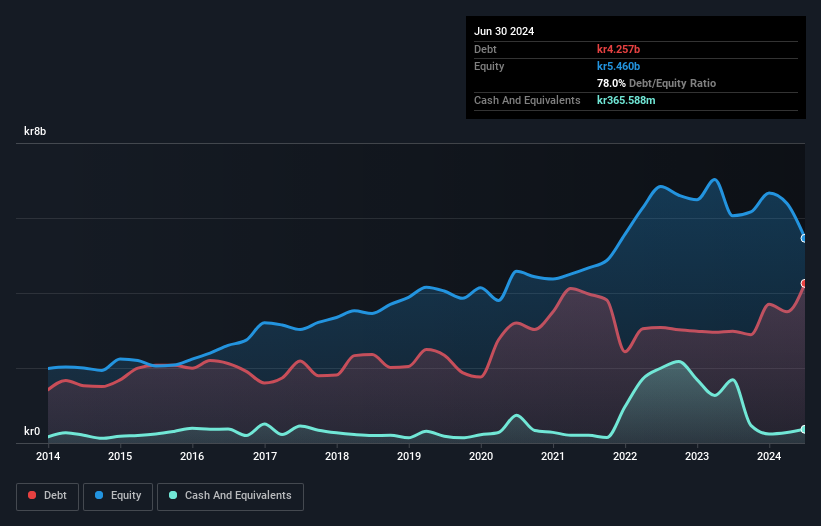
Some say volatility, rather than debt, is the best way to think about risk as an investor, but Warren Buffett famously said that 'Volatility is far from synonymous with risk.' So it might be obvious that you need to consider debt, when you think about how risky any given stock is, because too much debt can sink a company. We note that Grieg Seafood ASA (OB:GSF) does have debt on its balance sheet. But the more important question is: how much risk is that debt creating?
What Risk Does Debt Bring?
Generally speaking, debt only becomes a real problem when a company can't easily pay it off, either by raising capital or with its own cash flow. Part and parcel of capitalism is the process of 'creative destruction' where failed businesses are mercilessly liquidated by their bankers. While that is not too common, we often do see indebted companies permanently diluting shareholders because lenders force them to raise capital at a distressed price. Of course, plenty of companies use debt to fund growth, without any negative consequences. When we examine debt levels, we first consider both cash and debt levels, together.
See our latest analysis for Grieg Seafood
How Much Debt Does Grieg Seafood Carry?
The image below, which you can click on for greater detail, shows that at June 2024 Grieg Seafood had debt of kr4.26b, up from kr2.98b in one year. On the flip side, it has kr365.6m in cash leading to net debt of about kr3.89b.

How Healthy Is Grieg Seafood's Balance Sheet?
Zooming in on the latest balance sheet data, we can see that Grieg Seafood had liabilities of kr2.98b due within 12 months and liabilities of kr4.64b due beyond that. Offsetting these obligations, it had cash of kr365.6m as well as receivables valued at kr659.0m due within 12 months. So it has liabilities totalling kr6.59b more than its cash and near-term receivables, combined.
Given this deficit is actually higher than the company's market capitalization of kr6.43b, we think shareholders really should watch Grieg Seafood's debt levels, like a parent watching their child ride a bike for the first time. In the scenario where the company had to clean up its balance sheet quickly, it seems likely shareholders would suffer extensive dilution. There's no doubt that we learn most about debt from the balance sheet. But it is future earnings, more than anything, that will determine Grieg Seafood's ability to maintain a healthy balance sheet going forward. So if you're focused on the future you can check out this free report showing analyst profit forecasts.
Over 12 months, Grieg Seafood made a loss at the EBIT level, and saw its revenue drop to kr6.9b, which is a fall of 5.5%. That's not what we would hope to see.
Caveat Emptor
Over the last twelve months Grieg Seafood produced an earnings before interest and tax (EBIT) loss. Indeed, it lost kr376m at the EBIT level. When we look at that alongside the significant liabilities, we're not particularly confident about the company. We'd want to see some strong near-term improvements before getting too interested in the stock. Not least because it burned through kr1.4b in negative free cash flow over the last year. So suffice it to say we consider the stock to be risky. There's no doubt that we learn most about debt from the balance sheet. But ultimately, every company can contain risks that exist outside of the balance sheet. Be aware that Grieg Seafood is showing 1 warning sign in our investment analysis , you should know about...
When all is said and done, sometimes its easier to focus on companies that don't even need debt. Readers can access a list of growth stocks with zero net debt 100% free, right now.
New: Manage All Your Stock Portfolios in One Place
We've created the ultimate portfolio companion for stock investors, and it's free.
• Connect an unlimited number of Portfolios and see your total in one currency
• Be alerted to new Warning Signs or Risks via email or mobile
• Track the Fair Value of your stocks
Have feedback on this article? Concerned about the content? Get in touch with us directly. Alternatively, email editorial-team (at) simplywallst.com.
This article by Simply Wall St is general in nature. We provide commentary based on historical data and analyst forecasts only using an unbiased methodology and our articles are not intended to be financial advice. It does not constitute a recommendation to buy or sell any stock, and does not take account of your objectives, or your financial situation. We aim to bring you long-term focused analysis driven by fundamental data. Note that our analysis may not factor in the latest price-sensitive company announcements or qualitative material. Simply Wall St has no position in any stocks mentioned.
About OB:GSF
Grieg Seafood
Through its subsidiaries, operates as a fish farming company in Norway, the United Kingdom, rest of Europe, the United States, Canada, Asia, and internationally.
Undervalued with reasonable growth potential.
Similar Companies
Market Insights
Community Narratives




